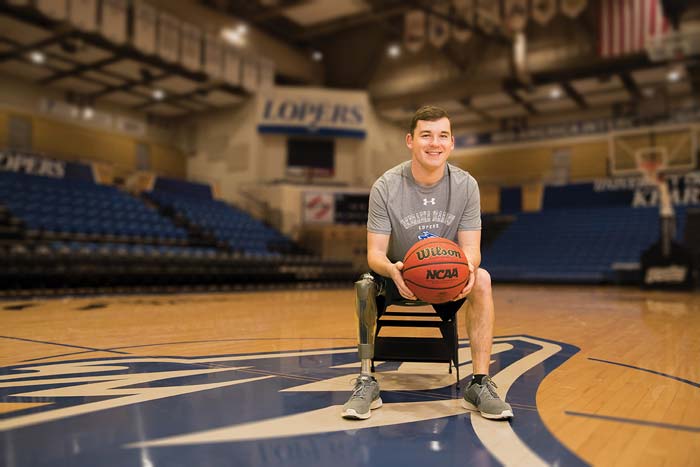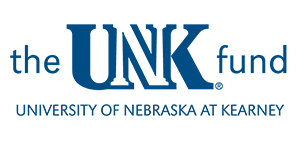A message of hope and help

A message of hope and help
UNK students like Luke Grossnicklaus pay it forward.
He tells the story of a boy in pain.
His right leg hurt. A disease called linear scleroderma was slowly taking it over — “suffocating it,” he says, stunting it, starting the year he was 4. While the boy’s body grew, that leg did not. He walked with a weird gait.
The boy’s heart hurt, too, because some days at school his pain was so bad that he couldn’t go out at recess to play. Some nights, his mom would stay up with him, rubbing his back as he cried.
Why is this happening to me? I don’t deserve this. I’m just a little kid.
But the people surrounding him took away some of the pain.
His friends stayed and played with him inside at recess time as he sat with an icepack on that leg. His teachers and coaches and the whole community of his hometown, Aurora, Nebraska, treated him like any other kid. So did his parents and two big brothers, who gave him lots of love but never any extra stokes when competed on the golf course. His brothers never took it easy on him when they wrestled with him in the house (before their mom told them all to stop).
Most everyone in his world, he says, saw that he was able, not dis-abled.
And that made him see it, too.
And everyone is the reason, Luke Grossnicklaus says, that he stands before young people today, whenever asked, and tells the boy’s story — his own story — because he knows it might help them overcome their pain, too.
Luke, who was UNK’s 2016 homecoming king, is studying business education. He would love to become a high school principal somewhere in Nebraska one day, maybe a coach. He was recently president of his fraternity.
Whenever asked, he tells his story to schoolkids.
He tells them that if they’re from broken homes or feel broken inside, that they can’t let their situation define their future.
He tells them they can get out of their own pain by helping other people in pain to cope.
He tells them there’s hope, even on the darkest day.
He tells then about his darkest day, which was when he was 12, and the doctors said they had to amputate that leg.
“Imagine being a kid who loves sports being told that,” he says.
He tells them that a kid with an amputated leg can be a college athlete and how he played on the UNK golf team his first two years, walking on as a freshman and then earning a scholarship his sophomore year.
One day, after speaking at a high school, a student approached Luke. Her parents had divorced and she hated one of them, she told him, for not being there for her. She thought her life was only going to get worse. She thanked him for his message.
“It felt good to help her,” Luke says. “It feels good to be that mediator between teachers and students and to encourage students with — ‘Hey, I’ve been here before. I know what it’s like. It may not be the same situation, but, hey, you’re not the only one going through it.’”
Luke tells his story because he’s able to. ABLE to. He emphasized that word whenever he tells his story. Not DIS-abled.
“That’s a big part of my message, why I’m so passionate, because I had a lot of people who helped me,” says Luke, who graduated this spring from the University of Nebraska at Kearney. “My whole message is that I wouldn’t be where I am today without the people surrounding me at my toughest and my darkest moments. That’s where we get stuck — when we don’t have the people around us.
“We need to be the people who are willing to help others in need.”
Support for students like Luke was one of UNK’s priorities in the University of Nebraska Foundation’s recent Our Students, Our Future fundraising initiative, which ended Dec. 31, 2017.
Luke says he sees a lot of young people like him who are already finding ways to give back. Millennials, who have grown up digitally connected to the world, he says, tend to care about the future and feel able to make the world better place.
A few examples of other UNK students and why they give back:
Miguel Baeza Aguilera
Recent graduate, degree in general studies
Hometown: Grand Island, Nebraska
Why do you give back?: My parents educated my siblings and me that it is always better to give than to receive. Impacting lives and seeing someone smile is the best feeling in the world. I also give back because I wouldn’t be where I am today everyone who took the time to support me throughout my life. You have to remember that someone is always looking up to you as their role model, so why not keep the chain reaction of giving back going.
Jaime McCann
Graduate student in the MBA program
Hometown: Kearney, Nebraska
How/why do millennials give back to the world?: After traveling to South America, I gained a new perspective on what it means to live in “poverty.” I believe that other millennials who have traveled abroad will attest to the same sentiment — once you are exposed to the lifestyles that those across the globe live in, you become so much more thankful for what we have here. This, in turn, provides inspiration to give back to others.
Emma Neil
Senior, 7-12 social science education major with endorsement in ESL (English as a Second Language) and minor in political science
Hometown: Papillion, Nebraska
How do you give back to the world?: I enjoy going on mission trips to different parts of the world and learning about other people’s cultures and countries. I know I was born with so many things that others could only imagine. For example, I am incredibly fortunate to have the opportunity to receive a higher level education. I think it is important to meet others and learn about their lives and how they are different, yet so similar to my own.
Clark Pohlmeier
Senior, business administration major
Hometown: Grand Island, Nebraska
Why do you give back?: Because it makes an impact in people’s lives. If I can spend a few hours positively impacting someone’s life, it’s worth it. Giving back strengths the communities. It’s also an avenue to meet other people and share experiences.
Whether you are a longtime supporter or a new graduate, you can impact students immediately through the UNK Fund. Every dollar invested in the UNK Fund provides scholarships, supports talented faculty, enhances your college’s priorities, and much more. And it all happens because of you.
If you would like to help, please contact the University of Nebraska Foundation at 800-432-3216 or send us a message.
